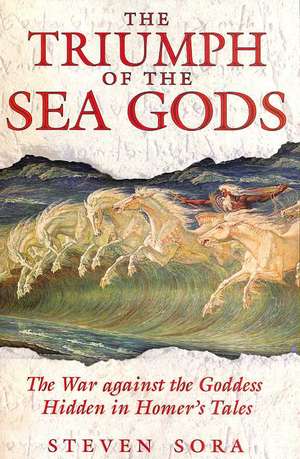The Triumph of the Sea Gods: The War Against the Goddess Hidden in Homer's Tales
Autor Steven Soraen Limba Engleză Paperback – 31 mai 2007
• Cites the rise in sea level in 1200 B.C. as leading to the invasion and victory of the Atlantean sea people over the goddess-worshipping Trojans who ruled the coasts
• Identifies Troia (Troy) as part of a tri-city area that later became Lisbon, Portugal
In The Triumph of the Sea Gods, Steven Sora argues compellingly that Homer’s tales do not describe adventures in the Mediterranean, but are adaptations of Celtic myths that chronicle an Atlantic coastal war that took place off the Iberian Peninsula around 1200 B.C. It was a war between the pro-goddess Celtic culture that presided over what is now Portugal and the patriarchal culture of the sea-faring Atlanteans. The invasion of the Atlantean sea peoples brought destruction to the entire region stretching from Western Europe’s Atlantic border to Egypt, Syria, and Turkey. This was a turning point not only politically but also spiritually. The goddess became demonized, as seen in myths such as Pandora’s Box in which woman was seen as the source of evil, not the origin of life, and Homer’s tale of the epic Greek and Trojan war, which was triggered by the abduction of a woman.
The actual historical struggle described in Homer’s stories, Sora explains, occurred during what was the last in a series of rises in sea level that inundated various land masses (Atlantis) and permitted sea passage to areas previously accessible only by land. The “Sea Gods” (Atlanteans) attacked the tri-city region of Troia (Troy), near present-day Lisbon, which, shortly thereafter, fell victim to a devastating series of seaquakes and tsunamis. The war and the subsequent destructive weather broke the power of this seaboard civilization, leading to a wholesale invasion by the sea peoples and the rapid decline of the region’s goddess-worshipping culture that had reigned there since Neolithic times. Sora shows how Homer’s tales allow the modern world to glimpse this ancient conflict, which has been obscured for centuries.
Preț: 138.19 lei
Nou
Puncte Express: 207
Preț estimativ în valută:
26.44€ • 28.28$ • 22.05£
26.44€ • 28.28$ • 22.05£
Carte indisponibilă temporar
Doresc să fiu notificat când acest titlu va fi disponibil:
Se trimite...
Preluare comenzi: 021 569.72.76
Specificații
ISBN-13: 9781594771439
ISBN-10: 159477143X
Pagini: 248
Dimensiuni: 155 x 227 x 18 mm
Greutate: 0.35 kg
Editura: Destiny Books
Locul publicării:United States
ISBN-10: 159477143X
Pagini: 248
Dimensiuni: 155 x 227 x 18 mm
Greutate: 0.35 kg
Editura: Destiny Books
Locul publicării:United States
Notă biografică
Steven Sora has been researching historical enigmas since 1982 and is the author of The Lost Treasure of the Knights Templar and Secret Societies of America’s Elite. He lives in Easton, Pennsylvania.
Recenzii
"Sora shows how Homer's tales allow the modern world to glimpse this ancient conflict, which has been obscured for centuries."--The New Archaeology Review, Vol. 3, Issue 1, Feb 2008
Textul de pe ultima copertă
HISTORY / ANCIENT CIVILIZATIONS "A well-written, fascinating, and scholarly investigation. This refreshingly new insight into the historical truth behind Greek mythology is a classic in its own right." --Graham Phillips, author of The End of Eden and The Templars and the Ark of the Covenant "Steve Sora boldly confronts one of the seminal events of Western civilization to debunk long-held assumptions concerning the Trojan War. The fresh perspective that emerges removes the tale from its classical location on the Aegean shores of Asia Minor and moves it to the lost civilization described by Plato, a task Sora accomplishes with dramatic clarity and thought-provoking credibility." --Frank Joseph, author of The Destruction of Atlantis In The Triumph of the Sea Gods, Steven Sora argues compellingly that Homer's tales do not describe adventures in the Mediterranean but are adaptations of pre-Celtic myths that chronicle an Atlantic coastal war that took place off the Iberian Peninsula around 1200 BCE. It was a war between Atlantean city-states that vied for power and trade along the Atlantic coast--a time when queens lost power to kings and goddesses were lorded over by gods. The resulting invasion of the Mediterranean by the Atlantean sea peoples brought destruction to the entire region, stretching eastward as far as Egypt, Syria, and Turkey. This was a turning point not only politically but also spiritually. The goddess became demonized, as seen in myths such as Pandora's Box, in which woman was seen as the source of evil not the origin of life, and Homer's tale of the epic Greek and Trojan war, which was triggered by the abduction of a woman. The actual historical struggle described in Homer's stories, Sora explains, occurred during what was the last in a series of rises in sea level that inundated various land masses (Atlantis) and permitted sea passage to areas previously accessible only by land. A powerful alliance of ancient sea peoples, most likely based near the Pillars of Hercules, attacked the tri-city region of Troia (Troy), near present-day Lisbon, which, shortly thereafter, fell victim to a devastating series of seaquakes and tsunamis. The war and the subsequent destructive weather broke the power of this seaboard civilization, leading to a wholesale invasion of the Mediterranean by the sea peoples and the rapid decline of the region's goddess-worshipping culture that had reigned there since Neolithic times. Sora shows how Homer's tales allow the modern world to glimpse this ancient conflict, which has been obscured for centuries. STEVEN SORA has been researching historical enigmas since 1982 and is the author of The Lost Treasure of the Knights Templar and Secret Societies of America's Elite. He lives in Easton, Pennsylvania.
Descriere
Steven Sora argues that Homer’s tales do not describe adventures in the Mediterranean, but are adaptations of Celtic myths that chronicle an Atlantic coastal war that took place off the Iberian Peninsula around 1200 B.C. The war led to the rapid decline of the region’s goddess-worshipping culture that had reigned there since Neolithic times.
